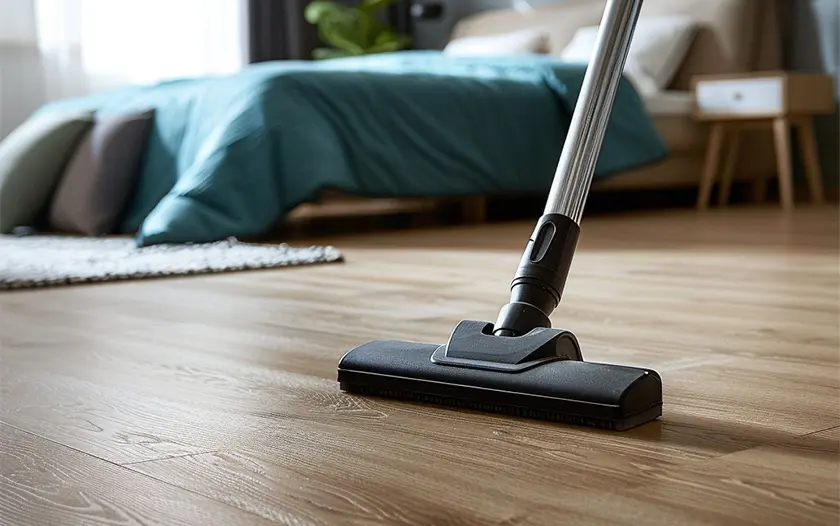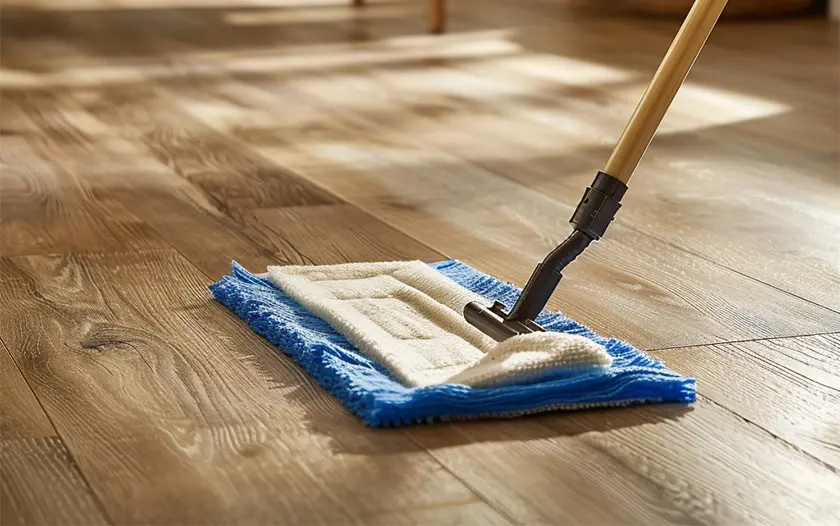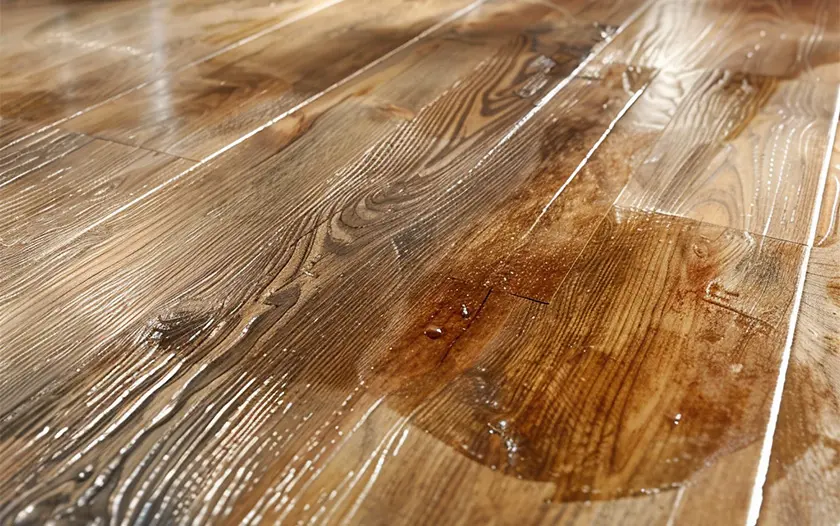Vinyl plank flooring is known for being easy to take care of. But even low-maintenance flooring needs some attention if you want it to look its best and last for years to come.
In this guide, we’ll cover everything you need to know about cleaning and maintaining your vinyl planks. We’ll cover daily upkeep, how to tackle those pesky stains, and essential tips to keep those floors looking fantastic.
The Basics of Routine Cleaning

Keeping up with a regular cleaning routine will make a world of difference in how your vinyl plank floors look and feel. Let’s break down the simple steps you can take:
It’s true that life gets busy, and vacuuming every day might not be on your priority list. A good starting point for regular upkeep is to sweep or vacuum vinyl flooring once or twice a week. Notice how your floors look after a couple of days – do you see a lot of dust, crumbs, or pet hair building up? You might consider a quick daily sweep in high-traffic areas.
When talking about tools you should be using, what we want to think about here is gentleness. Avoid stiff bristles or harsh beater bars that can scratch your vinyl floor’s beautiful surface. Opt for a soft-bristled broom that will effectively whisk away larger debris like crumbs and dust bunnies.
If you prefer a vacuum cleaner, make sure it has a hard floor setting. This setting disables the rotating beater bar, which is designed for carpets and can be too abrasive for vinyl planks. Some vacuums even come with specific attachments for hard floors, featuring softer brushes that are gentler on the surface.
Mop once or twice a week, depending on how much foot traffic your floors see. Gentle cleaners are your best friend. A few drops of dish soap in warm water works great, or consider a cleaner specifically made for vinyl floors. Skip those harsh chemicals!
For example, a simple solution of vinegar and warm water is a fantastic choice. Mix about one cup of white distilled vinegar to a gallon of warm water. For even shinier floors, add a drop or two of baby oil to the mix.
Use a damp mop (not soaked!) and tackle your floor in small sections. Rinsing the mop often is key. Afterward, dry the spots with a clean, dry towel.
Important note: Not all vinyl plank floorings are completely waterproof. We want to avoid letting water sit on those floors for too long.
When it comes to keeping your vinyl floors looking their best, a little prevention goes a long way! Let’s talk about some simple habits that can save you a ton of cleaning effort down the line:
Think of doormats as an extra layer of defense against dirt and debris. Place them at all your entrances, and they’ll work to catch a lot of the dust, grit, and other stuff that would otherwise end up on your floors. Remember that dirt buildup can scratch your floors over time. Doormats save you a lot of cleaning hassle in the long run!
Another practice that can really make a difference in maintaining your floors is adding furniture pads. They create a soft barrier between the furniture and floors that prevent scratches when you move things around.
The best part about these preventative measures is that they make your life easier! Less dirt means less sweeping and vacuuming and fewer scratches mean your floors stay looking their best.
Vinyl Flooringnbsp;Cleaning Solutions

Here are some examples of gentle cleaners suitable for vinyl plank flooring:
Dish soap: A few drops of mild dish soap in warm water is a classic solution. It cuts through grease and grime without being too harsh and rinses away cleanly.
White distilled vinegar: Diluted in water (about 1 cup per gallon), vinegar is a natural cleaner and mild disinfectant. It leaves no residue and tackles everyday dirt effectively.
Commercial vinyl floor cleaners: Brands like Bona, Swiffer, and Zep specifically formulate cleaners designed for vinyl floors. These often have added benefits like streak-free formulas or pleasant scents.
Baby shampoo: This ultra-mild option is a safe bet for vinyl planks and can be used similarly to dish soap (a few drops in warm water).
Cleaning solution recipes:
Vinegar solution: Combine one cup of distilled white vinegar with a gallon of warm water. For a subtle shine, stir in a drop or two of baby oil.
Gentle soap solution (if you prefer): Add a few drops—and no more—of mild dish soap to a gallon of warm water. Thoroughly rinse your mop after cleaning.
Important Note: It’s always best to do a small spot test in an inconspicuous area with any cleaner before applying it to your entire floor.
Vinegar Is Your Floor’s Best Option
Vinegar (especially white distilled vinegar) is a natural and gentle cleaner that makes a fantastic choice for vinyl plank floors.
Vinegar’s acidity helps break down grease, stubborn dirt, and any residue from soapy cleaners. Unlike soap, vinegar evaporates completely, leaving behind no streaks or soapy films that can attract more dirt.
Additionally, Vinegar has mild disinfectant properties, which is a bonus for cleaning floors.
When doing thorough vinyl flooring cleaning, it’s recommended to start with vinegar-based cleaner. If it doesn’t cut through tougher grime, give a very diluted soap solution a try, and always rinse your floors well after.
If you are dealing with some especially stubborn stains focus on that one area in particular and avoid using strong solutions on the whole floors.
Important Tip: While vinegar is safe and effective for vinyl floors, it’s still important to dilute it. Using straight vinegar may be too harsh over time and can dull the finish.
Dealing With Stubborn Stains

Lina
Tel:+86 13382250456


























